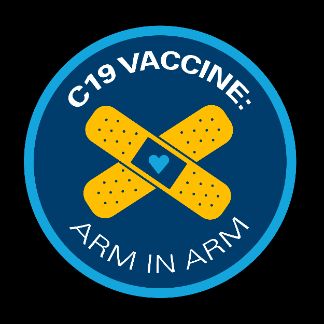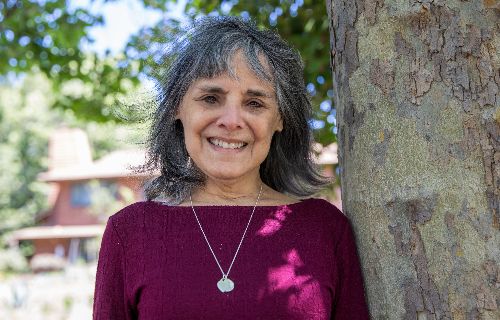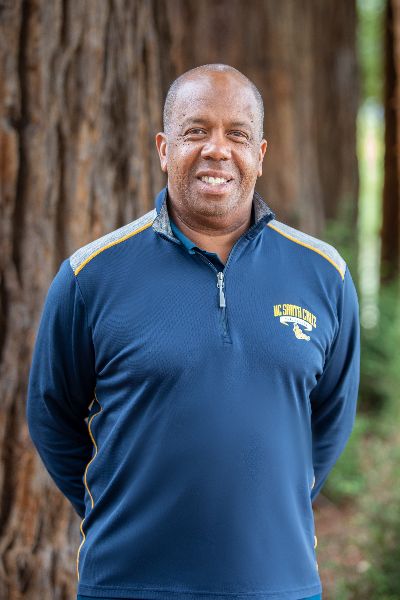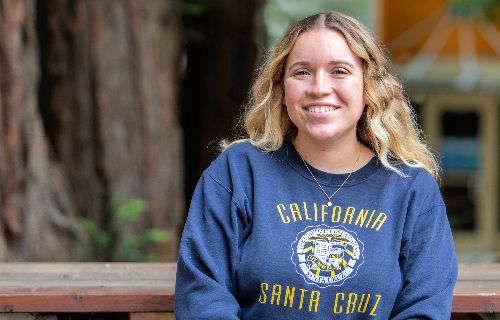Campus News
A shot in the arm
Six UC Santa Cruz community members tell the tale of getting the COVID-19 vaccine in 2021.

This story is part of UC Santa Cruz’s vaccination advocacy campaign, Arm in Arm, which is aimed at communicating to our campus community the importance of the COVID-19 vaccine for a safe reopening of California and UC Santa Cruz.
After a year of teaching the biology of coronaviruses, specifically the SARS-CoV-2, along with the immune responses to viruses and vaccines, UC Santa Cruz Professor of Molecular, Cell and Developmental Biology Martha Zúñiga was able to add herself to the story.
“I was so excited to get my COVID-19 vaccine,” she said. “I felt the same excitement that I felt on Christmas morning when I was a little girl.”
As the University of California announces its vaccine requirements, with FDA approval, and the return of in-person instruction this fall, scientists and faculty members like Zúñiga, as well as staff members and students, share their stories of getting their shots.
They’re people like Bill Prime, who heads up UC Santa Cruz Dining Services, which worked through the pandemic to provide meals for students.

When in-person instruction was suspended and shelter-in-place orders mandated at the university in March 2020, Prime’s operations were upended. Cafés were closed, and dining-hall meals moved to take-out mode with a new app for ordering, Plexiglas barriers, and compostable to-go containers and bags.
“The giant Post-it notes all over my office tell the tale of change, which was constant for my 35 managers and 158 career staff,” he said. “Twice a week, we’d have meetings to update the staff on mask mandates, tests, and safety protocols.”
In order to keep everyone working or busy, they contracted with the county to provide food for 16 homeless shelters, and last summer, when the campus was evacuated during the CZU Lightning Complex fire, they relocated to the Boardwalk’s Cocoanut Grove. They provided more than 3,000 meals a day for displaced community members and fire victims.
While the COVID-19 vaccines were in development, Prime acknowledged that he didn’t want to be an early adopter.
“But cases started to spiral out of control, and we had people testing positive,” he said, “I realized I needed to take the lead. When our team was able to get to the first round in February, I was at the front of the line for the shot.”
A teaching moment
Zúñiga taught her students about numerous topics related to COVID-19, such as its neurological, pulmonary, and coronary effects; the physics and efficacy of face coverings; the psychological wellbeing of caregivers treating COVID-19 patients; and complications of the virus.

“We spent one day studying a mouse model of the prototypical Moderna vaccine and of the immune response to it and its efficacy in the mouse model,” she said.
She hasn’t been able to convince everyone of the importance of immunization, but she’s quick to describe what it was like for her after her shot.
“I did have flu-like symptoms after the second dose—chiefly chills, fever, malaise, and aches,” she said. “I expected these, and I was prepared. I scheduled my vaccines on a Friday so I would have the weekend to recover from them. The symptoms began about nine hours after I received the vaccine and lasted for a total of about 42 hours. But the chills lasted only about 12 hours, and the fever lasted less than 24 hours.”
As the vaccine continues to roll out, Zúñiga said, “I want as many people to be immunized as possible. It feels so liberating to know that we can be together, as long as we’re immunized. I also want people not to drop their guard, to continue to wear masks and take other sensible precautions, such as avoiding crowds.”
Back out in the field
Cynthia Kern, a staff researcher at the Institute of Marine Sciences, says the last year has been a challenge, both with the pandemic and with the CZU Fire. As a coastal salmonid ecologist, she researches salmon populations in local watersheds, and her crew has been able to keep up with the field work, following strict COVID guidelines and requirements.
“Most of the people I work with are younger than me, and for a year, I didn’t go out in the field with them,” she said. “I stayed in my house, working on data and scheduling. It was hard.”
When her turn came to roll up her sleeve, she was happy. But there were side effects in the middle of the night after the second shot.
“Chills, fever, cold sweats, shaking, dizziness, nausea—I was not feeling well, and I canceled meetings the next day to stay in bed,” she said.
If she were to tell others who are afraid to get the shot, she’d say, “You may have unpleasant side effects, but that’s good. The vaccine is meant to trigger your body to recognize that antigen, to fight it.”
After a year of turning away student interns to work in the field, she’s conducting interviews in the hopes the university will allow internships to resume in the summer and fall.
“If requiring vaccinations helps valuable research to ramp up, then I am all for it,” Kern said.
A student’s vaccine experience
For Claire Egan (Merrill ’21, molecular, cell and developmental biology; education minor), the coronavirus vaccines represent an unprecedented scientific achievement.
She got her first dose of the Moderna vaccination back in January, before almost anyone she knew, as she worked at the university’s COVID-19 testing site. She experienced side effects the day after her second shot, with a headache, sore arm, and chills.

“In the weeks following my vaccines, I was surprised by how much better I felt emotionally,” she said. “None of my social distancing or mask-wearing routines had changed, but I was able to feel safer at work as a COVID tester, and at home, where I lived with seven housemates. It made everyday experiences like going to the grocery store feel less stressful as well.”
After her shots, she worked at the Cowell Ranch Hay Barn vaccination site, handing out vaccination cards to people after their first doses.
“It was great to see a diversity of people in the UCSC community and their excitement for a step forward,” Egan said. “The pandemic changed the plans I had for my final two years of school and made me feel disconnected from college life. Despite these challenges, I think I will look back and be proud that I found a way to help the UCSC community through testing and vaccination.”
‘Trust the science’
Bari Nazario, facilities and flow cytometry manager for the Institute for the Biology of Stem Cells, was relieved when she was able to get her second Moderna vaccine in mid-February. She’s worked throughout the pandemic and has checked on the labs every week on campus.
She also felt a little teary-eyed. “When I got that first vaccine, it was a pretty emotional day, and I still feel that way,” she said. “We made it, my husband and I and my 93-year-old father, who is living alone. The relief was overwhelming.”
She said she sees the vaccine as our way to open the world again, and she’s cautiously optimistic.
“I feel like we’re in a waiting mode, and if we can get through next winter and see the efficacy of these vaccines, then I think we’re in a good spot,” she said.
As for the people who are hesitant to get vaccinated, she said, “If I could say one thing, it’s this: Trust the science. Do your research, and try to make the best decision for yourself and for the people around you. Science says the virus needs people. So, if we’re all vaccinated, it all dies out.”
A granddaughter’s story
For Zeka Glucs, academic coordinator for the Santa Cruz Predatory Bird Research Group, the pandemic has been an historic one for her family. She and her sister cared for their grandmother, Elaine Heyman, who was born during the Spanish Flu, also known as the 1918 influenza pandemic. She died on May 14 of this year, just a few weeks before her 103rd birthday.
“It’s been a time of holding my breath, as I was terrified of bringing the virus to someone I love,” said Glucs, who continues to do research and teach remotely but looks forward to being back on campus.
Her grandmother was able to get vaccinated in February, and it took a month or two before the rest of the family could enter the same safety zone. For Glucs, the only side effects from the Pfizer vaccine were a little fatigue and a sore arm.
“I never second-guessed getting the shot, because of my personal circumstances—and because I trust the science,” she said. “It felt like a family accomplishment for all of us to be vaccinated and to be able to be with my grandmother in her passing.”
Find information and locations to receive your COVID-19 vaccination on the UCSC Student Health Center website.
Download an Arm in Arm Zoom background from the UC Santa Cruz Communications & Marketing website.